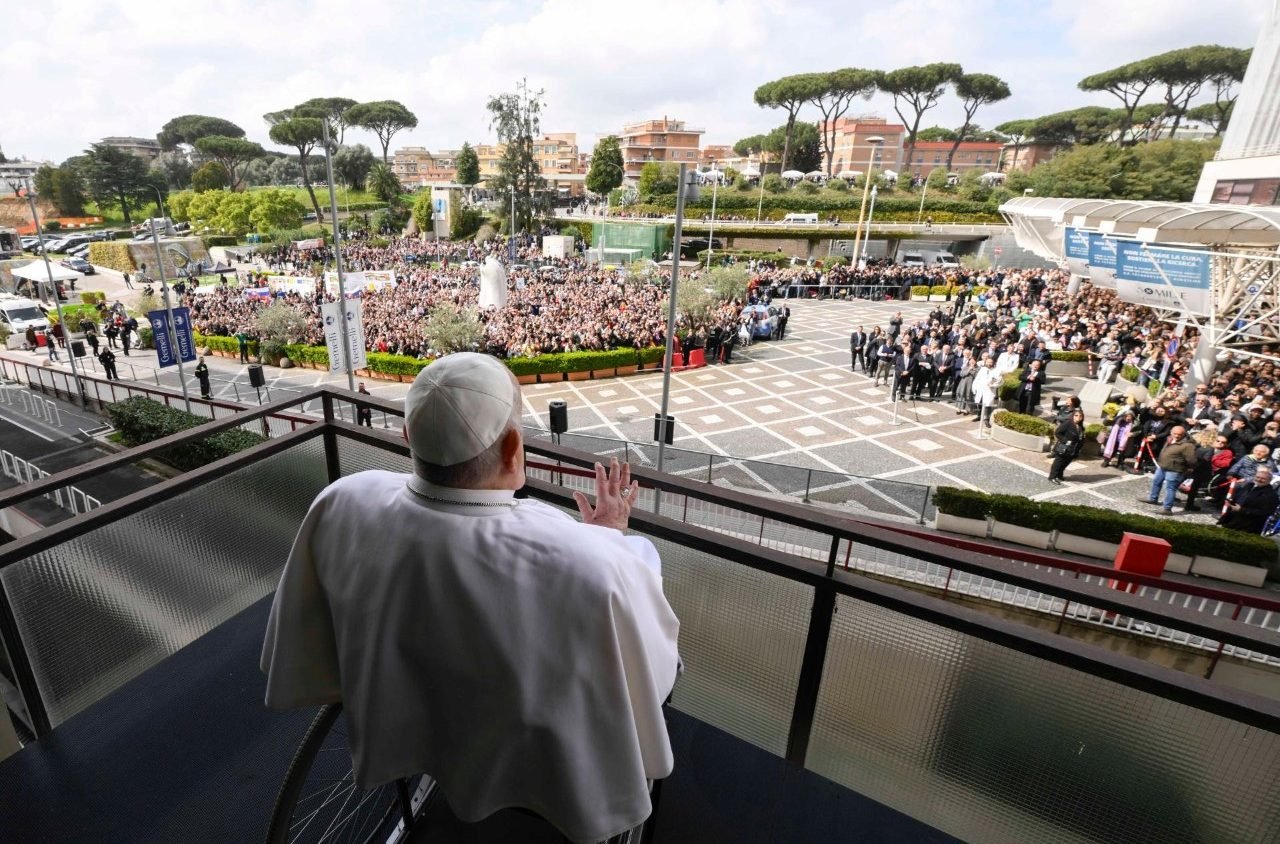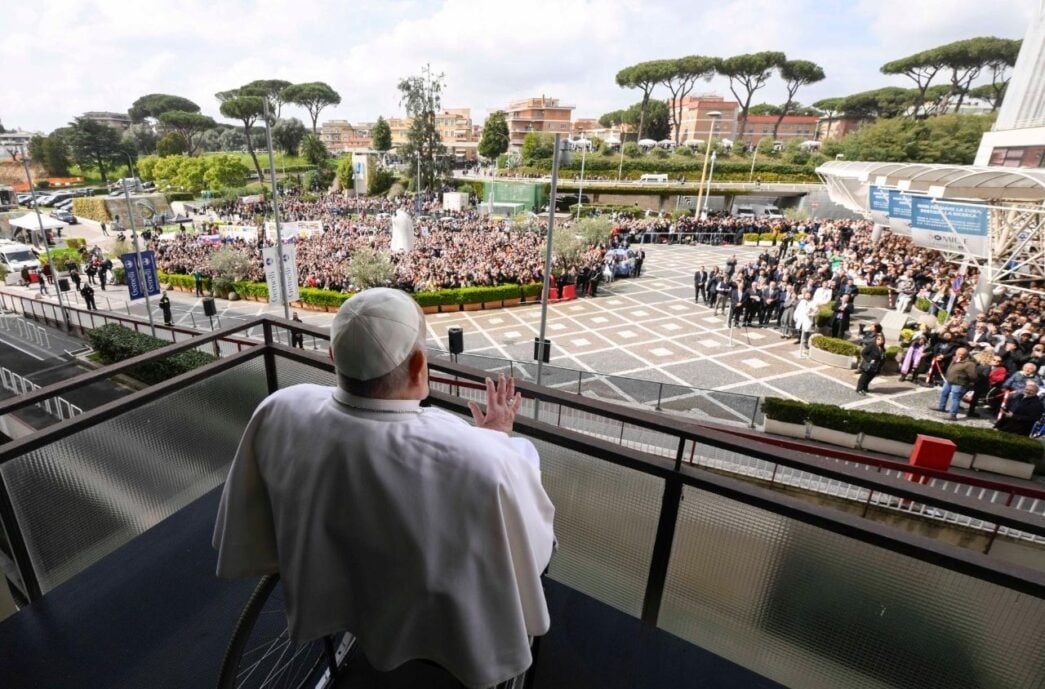Pope Francis greeting and blessing the crowd from the Gemelli Hospital | Photo: Vatican media division
It’s nothing to laugh off, however tempting. If the movies imitate life, we may not be as far away from an African pope. It happened in The Conclave, a film by Peter Straughan released in 2024, based on the novel by Robert Harris.
Through the intrigues, rivalries and scandals of the plot, Adeyemi, a Nigerian cardinal at the Conclave, almost emerged as pope before a contestant snookered him with the scandalous love story involving him and a nun, Shanumi, who had a child for him while he was 39 and she was 19.
If the plot sounds like something from the fertile imagination of the movie director, a Nigerian, Arinze Cardinal, came close to claiming the papacy in 2005. Arinze didn’t miss it because of any scandals. Once the youngest Catholic bishop in the world, he was judged not just as one of Africa’s best but also as a global theological legend. Still, he was a nearly pope.
Banking on hope
Advertisement
That was two decades ago, when the papacy was a relay amongst a few European countries, with Italy claiming the lion’s share of 217. Pope Francis was the first Jesuit and cardinal from the Americas to rise to the top of the papacy, raising hopes that the next one may come from Africa or Asia.
This hope is not based solely on legend. Africa is the fastest-growing region for the Catholic Church, with about 20 percent of the church’s 1.4 billion population. This demographic shift has spurred optimism that, after the Americas, Africa or Asia could produce the next pope, and better if he is the first Black pope in modern history.
What does it mean for Africa?
Advertisement
An African pope will inspire faith across the continent, demonstrating that, when it matters, the church casts its vote where its mouth is. Papal historians say that some early popes were from North Africa, citing Victor I, Miltiades I, and Gelasius I, from Roman-era Africa.
But Africans are unwilling to exhume the tombs of papal history going back to the 5th century for the remains of the last Black pope. They argue, for example, that if grace is the leveller, the rock upon which Peter’s Church is built, the baton of its highest office cannot be made to look like the exclusive right of three European countries – Italy, Germany and France.
An African pope might be the most unambiguous indication yet that the Catholic Church might be inclined to continue with the legacy of Pope Francis, especially his advocacy for the poor, marginalised, and developing countries. And perhaps more than any time in the recent past, Africa has a solid lineup at this year’s Conclave.
The lineup
Advertisement
OK, only a few bookmakers are betting on any of the 18 African cardinals in Rome. Most forecasts put their chances at 14 percent or less. Yet, Cardinal Peter Kodwo Appiah Turkson of Ghana, Cardinal Fridolin Ambongo Besungu of the Democratic Republic of Congo, and Cardinal Ignace Bessi Dogbo of Côte d’Ivoire are among the best crop you can find anywhere in the world.
The least favoured African candidate, Cardinal Robert Sarah from Guinea, is not because of competence. He is a risky candidate because of his age (79, three years older than when Francis assumed the papacy) and his conservative views. His position on various issues, from LGBTQ rights to the exclusive use of Latin for the liturgy, puts him at odds with most European electors.
Stars not enough
Despite its bright stars, why does Africa still appear unlikely to get the number one spot? Cardinal Sarah’s dilemma – his mainly conservative views – reflects not only the sentiment amongst the other 17 cardinals and the predominant position of the 281 million faithful on the continent, this conservatism also impairs the chances of the African cardinals.
Advertisement
The beggar church
Yet, conservatism is only one of the many obstacles. The African church may have the fastest-growing flock, but it is also the begging bowl. In a world where money is the bicycle of the gospel, the African church is the largest recipient of many forms of financial aid. Although the irony is less rampant among the Catholic church than it is among Pentecostals, Africa has some of the world’s richest Forbes-worthy pastors in contrast to the majority of the poor flock.
Advertisement
According to one statistic, at 32.6 percent between 2020 and 2023, the African Catholic church received the largest assistance per region from the Catholic Charity Aid. Compare this with the German national church, for example, which has $26 billion of the net assets of the Church.
Some also argue that African cardinals have limited chances because they have faced less scrutiny. An article published by www.devdiscourse.com on April 22 acknowledged that even though a figure like Cardinal Turkson has emerged as a potential candidate, “Vatican insiders highlight the lack of public scrutiny by African contenders compared to their Western counterparts, potentially complicating their candidacy.”
Advertisement
Conclave politics
Yet, others say politics may be the most potent obstacle against African candidacy, reminiscent of the deadly secret plots in Straughan’s movie once the doors in the Domus Santa Martha were shuttered and millions of the faithful waited outside the Sistine Chapel to see the white smoke and the face of the new pontiff.
Advertisement
It won’t take very long to find out. Pope Francis wanted his successor elected within two weeks of his death. It used to take much longer. In The Conclave, for example, which spiked 283 percent across streaming platforms in one day from 1.8 million to 6.9 million, it took five votes over an unspecified period to elect the cardinal from Kabul, Cardinal Benitez.
The longest papal conclave after the death of Pope Clement IV lasted almost three years, from November 1268 to September 1, 1271, after which Pope Gregory X was elected.
Long road to change
For the pontificate and the faithful, it’s been a long road since. The Catholic Church has evolved from its medieval conflicts, reformation and counter-reformation through seasons of loss of power.
While books like In God’s Name: An Investigation into the Murder of Pope John Paul I by David A. Yallop highlight the tragedy of an institution endangered by internal corruption and fierce power play, the bestseller, The Da Vinci Code by Dan Brown explores the grip and fascination of theological myth over the faithful and even millions of non-believers.
Yet the encyclicals of Pope Francis, his willingness to confront dogma with doubt and creed with charity, show the extent of introspection and modernisation in the Church. As the world waits for the white smoke from the Conclave, those who hope these changes may be so profound as to produce an African pope may have to wait a bit longer. Perhaps a sequel to Straughan’s movie would be the sign.
The odds, this time, favour yet another Italian pope.
Ishiekwene is Editor-in-Chief of LEADERSHIP and author of the book Writing for Media and Monetising It.
Views expressed by contributors are strictly personal and not of TheCable.



